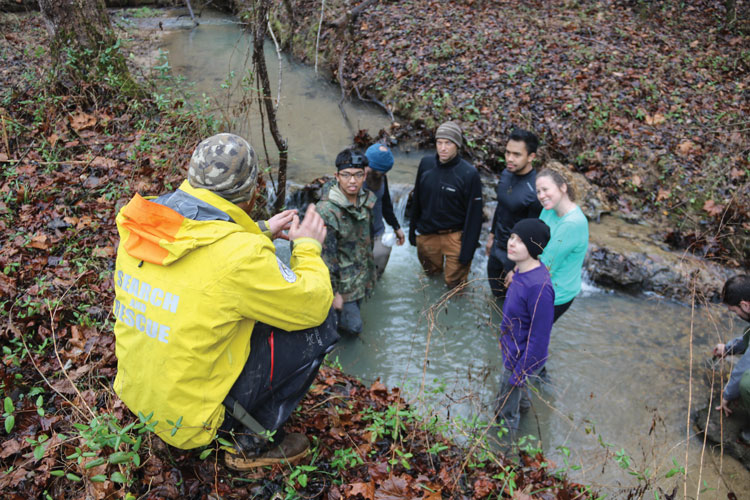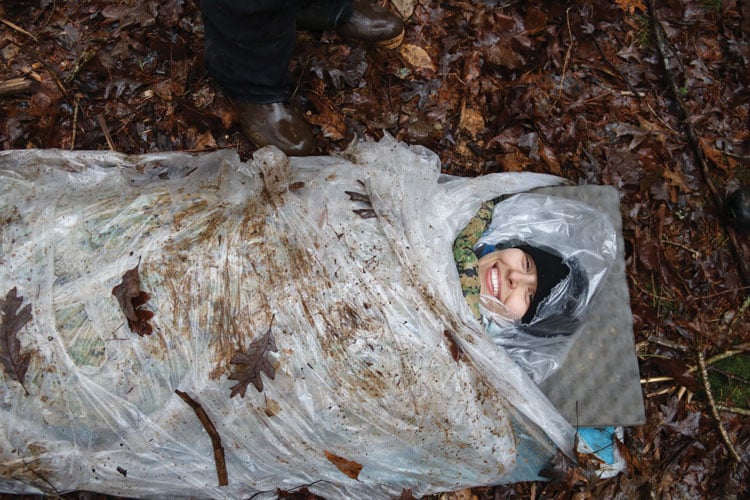Search and Rescue leader Andrew Herrington throws his students into icy creeks and teaches them how to save themselves. Our travel editor Ellen Kanzinger signed up.
When I registered for Andrew Herrington’s Survival 101 class, he told me, “I hope it’s cold as shit for your class.” That’s his mentality when it comes to teaching wilderness survival. Train in the worst conditions and you’ll be able to survive anything.
He certainly got his wish there. Although the temperature over the weekend only dropped to 38 degrees, Mother Nature blessed us with a near constant cold rain for 24 hours. By the end of the two-day class, I couldn’t remember what it was like to have clothes that weren’t damp.
I met Herrington, founder of Team BUSAR and a National Park employee, last year for a story about winter wilderness survival. He started BigPig Outdoors in 2013, teaching a variety of classes on land navigation, tracking, and survival. After writing the article, Herrington invited me back to experience one of his classes for myself.
In January, BRO Editor-in-Chief Will Harlan and I traveled to Tallassee, Tennessee for a weekend in the woods. From the moment we arrived at the campsite on a Saturday morning, Herrington put us to work collecting cattails for our bedding that night.
We spent the bulk of the day going over a variety of wilderness survival topics, including basic first aid, search and rescue procedure, signaling, and cultivating the right mindset in a stressful situation.

The weather was surprisingly mild at first, and I was warm in my thermal shirt, fleece pullover, and puffy jacket.
“This isn’t that bad,” I said to myself. “I don’t know what I was so worried about. You totally got this.”
As we moved into the basic principles of starting and maintaining a fire, the wind began to pick up and the rain rolled in.
Talk about training in some of the worst conditions possible. There is nothing quite like trying to get a fire going as the rain comes down, your hands shake from the cold, and Herrington yells at you to gather more pencil-sized twigs or else your baby dragon won’t have enough food to survive. Your baby dragon being your baby fire that you need to feed and nurture as it grows.
This was the source of my anxiety all week as the chance for rain that weekend increased every time I checked the forecast. Now that the rain had arrived, there was nothing I could do but get through it.
Our class of six decided to build two shelters that night with a fire in the middle to keep us warm. But we lacked a sense of urgency in gathering our supplies.
Darkness came quickly, ensuring our job would be infinitely harder. I stumbled around the woods looking for saplings to build our shelters’ frames. With my headlamp as my only source of light, I only narrowly avoided twisting my ankle and falling down the hill on several occasions.
Lesson learned. If you’re stuck in a situation where you know you’ll have to spend the night outside, whether it’s because you’re lost or your transportation breaks down, start constructing your shelter as early as possible.
After dinner, it was time to start our fire and settle in for the night.
Normally I find the sound of rain comforting as I fall asleep. But as each raindrop fell on the plastic tarp a mere six inches from my face, all I could think about was how cold and damp I was. I had lost all sense of time hours ago. Or maybe it had only been a few minutes since I lay down. My heart would start racing at the quietest sound coming from outside.
As the fire would die down, the shelter would cool off and it became harder to control the shivers making their way through my body. I would get up, add more fuel to the fire, and build it back up to a roaring flame. This cycle continued throughout the night, ensuring I was never comfortable enough to fall asleep.
Sunday consisted of more lectures and drills. And lots of fires. We started fires with wet lighters, fires with flint bars, fires with a kindling kit we made, and fires with kindling we found naturally.
As we competed against the rain to get our fires going, I could hear Herrington in my head saying, “Always cheat, always win. Carry the shit you need.”
Lesson learned. Fires are much easier to start with a homemade starter kit of fatwood sticks and Vaseline covered cotton balls than anything we could find naturally. Plus, carrying a kit cuts down on time foraging for supplies.
Herrington then demonstrated multiple uses for a clear garbage bag, such as ripping a hole for your face and arms and wearing it as an insulator to keep warm.
The weekend culminated in the “man or woman in the creek” drill. In the weeks leading up to the class, this was the part I dreaded the most. The point is to simulate a full body immersion scenario where you have to drag your cold, wet body out of the water and build a fire before hypothermia sets in.
We started with just our feet and shins submerged in the creek. As we adjusted to the temperature, a refreshing 51 degrees, we slipped deeper into the creek until only our heads were above water. One by one, Herrington called on each person to think about the reasons they were taking the class and then dunk their head underwater.
I lost track of time again as I struggled to breathe through the cold. I couldn’t have been in the water for more than five minutes before Herrington called my name to get out. Stumbling up the creek bank, struggling to put one foot in front of the other, I went off in search of firewood.
A deep sense of satisfaction set in when I was finally able to get my fire going despite a lighter that wouldn’t work, water dripping from every inch of body, and fingers too stiff to grasp anything tightly.
I am not going to lie. I consider that weekend to be among some of the worst 36 hours of my life. But next time I head outside, whether it’s just for a day hike or a week-long trip, I will be prepared for just about anything that may happen, repeating Herrington’s mantra: Always cheat, always win.
Key Takeaways:
1. Let someone know where you’re going and when you plan to be back. Fill out a trip plan from BigPigOutdoors.com with all the details a search and rescue team could use if you go missing.
2. Always carry a puffy jacket and fire-starting tools, even in the summer. Temperatures can drop overnight, and you don’t want to be caught without the right gear. Add in a few clear garbage bags and you’ll be set.
3. Take a wilderness survival course. Better to learn the skills and never use them than be caught unprepared in an emergency situation. After that, take a wilderness first aid class and a land navigation class. As Herrington says, “If you do all of that, you’re ready for 99 percent of wilderness emergencies.”
4. “You can treat an infection, you can’t treat dead.” When it comes down to survival or a virus, drink the water. It typically takes a few days for symptoms to manifest and most survival situations are over within the first 12 hours.
Thanks to Andrew Herrington, Brian Borkowski, and Greg Grieco, members of Team BUSAR, a search and rescue team operating in Great Smoky Mountains National Park, for sharing their expertise and tips with the class.








